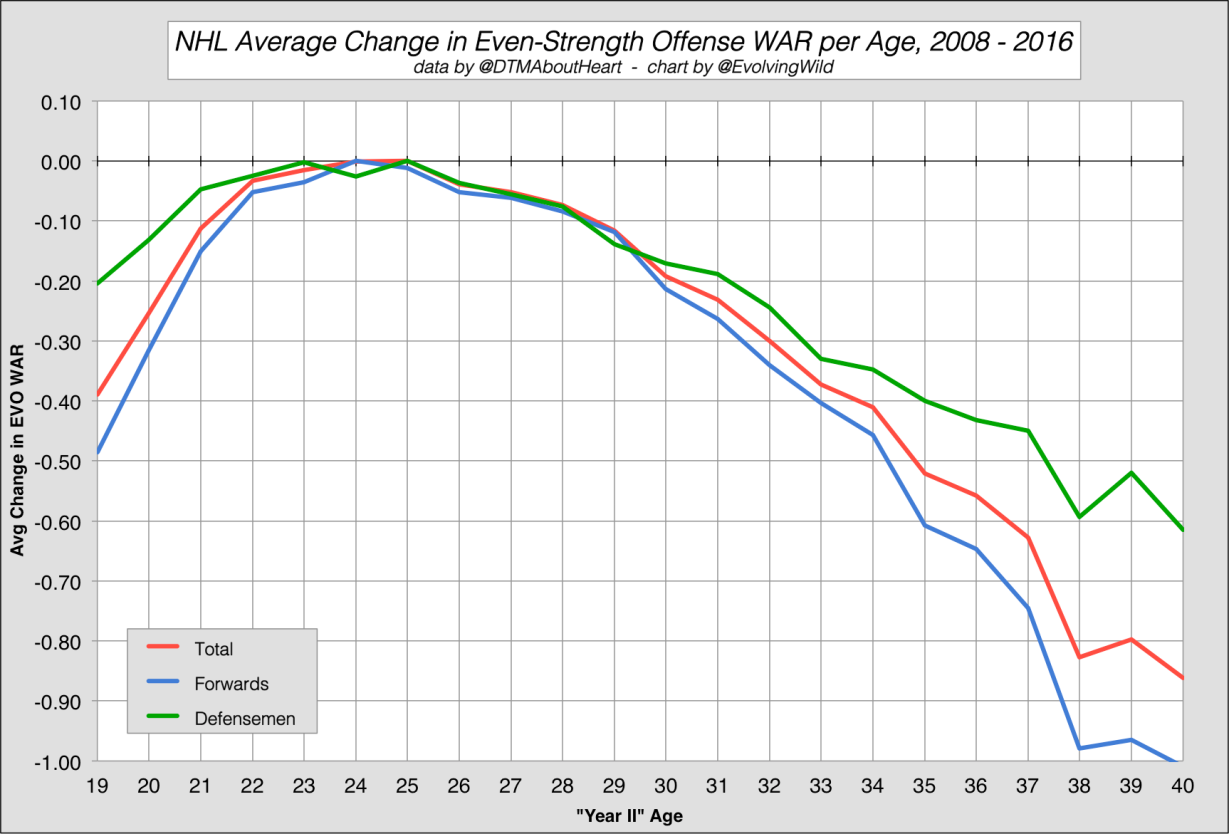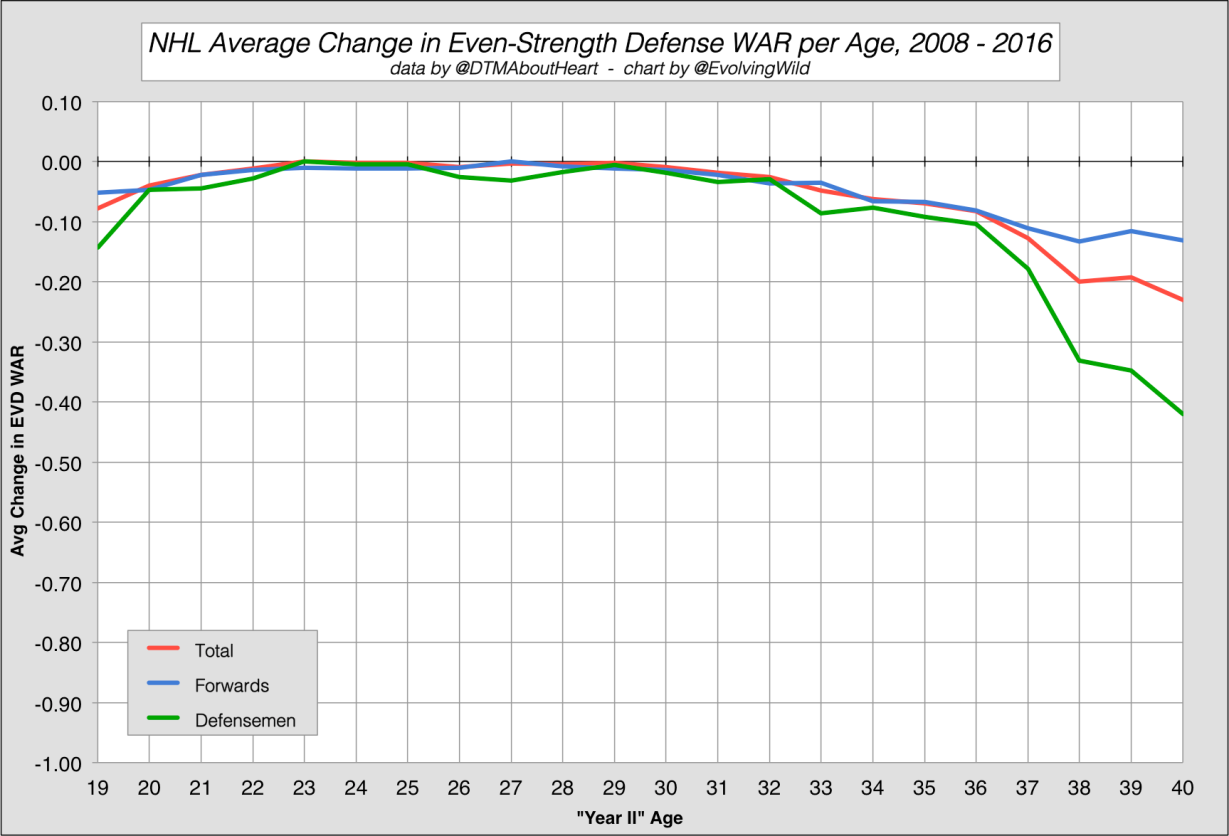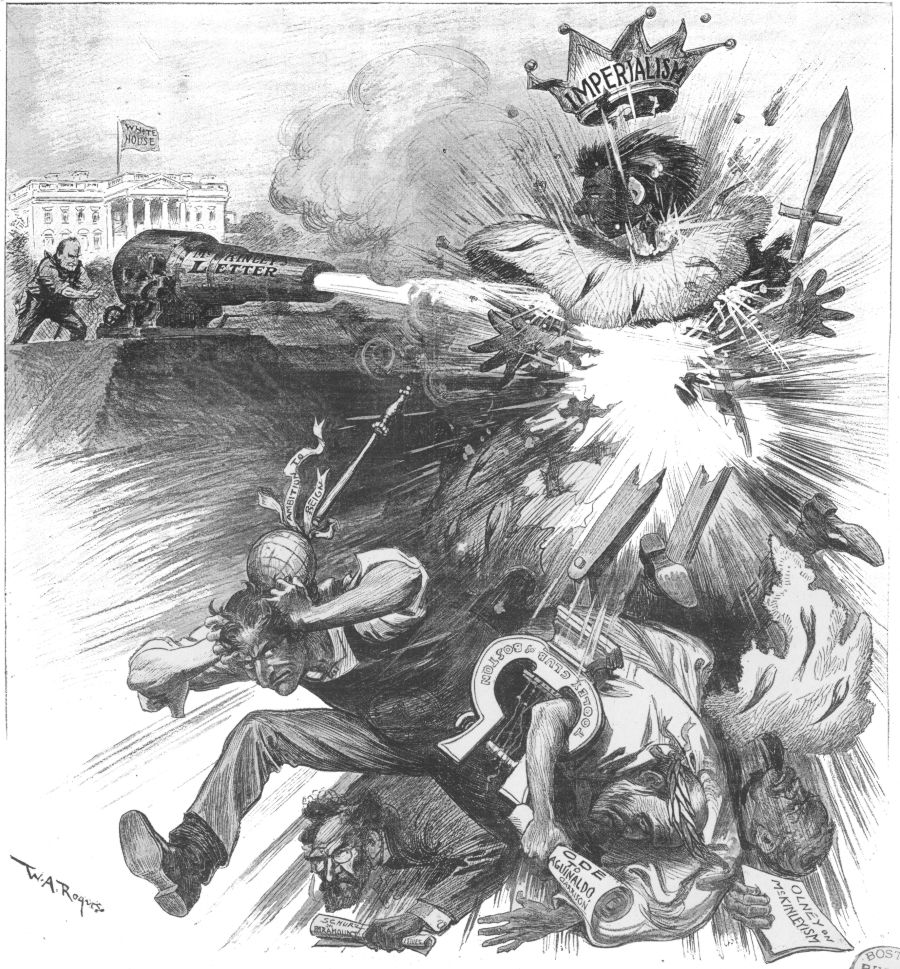twabby
Registered User
- Mar 9, 2010
- 13,730
- 14,648
Appreciate the time and effort that went into this. Gotta concede that it's not bad players throwing the curve off.
I still think the other possible flaw I mentioned - that the WAR stat isn't accurately assessing defensive WAR because it's not adjusting enough for deployment - is a much more likely explanation for the weird defenseman aging curve than hockey defensemen entering the NHL as finished products. As HFTN mentioned, I think the separate aging curves for offensive and defensive WAR in the original article you posted support this. The offensive one is a pretty standard aging curve for both forwards and defensemen:

While the defensive one is this weird plateau from about 20 to 32:

Either defense in hockey is some bizarre innate talent that lasts long after age-related decline dulls other skills, both in hockey and in every other sport I've seen aging curves for, or maybe hockey analytics just aren't at the point yet where they can properly adjust for differences in difficulty of deployment, and coaches naturally give players harder roles as they improve and easier roles as they decline, leading to a smoothing of the aging curve? The hockey analytics community borrows a lot of concepts from baseball analytics, as this article demonstrates, but this is one of the things where there's really no precedent in baseball. Every first baseman on every team in baseball is asked to make the same plays in the field and face the same pitchers, there's no way for teams to shelter a guy if he's bad or give him tougher assignments if he's good, and the only "systems" in place are shifts or tailored pitching approaches that are easy to quantify. As a result, comparing a player to the replacement level at their position is pretty straightforward (although even in baseball, quantifying defense is the still a matter of serious debate and even stat nerds take defensive metrics with a huge grain of salt). In hockey there's a massive difference between what the 1LD and the 3LD on the same team are expected to do and who they face, and there can be a massive difference between the roles of 1LD's on different teams, and their roles might change within a single game based on the game situation or what the opposing team's doing. I'm sure Dawson Sprigings is brilliant, but he can be brilliant and still not get quantifying defensive value right on the first try. There's a lot of really smart guys working on the much easier task of quantifying defensive value in baseball, and they haven't gotten it nailed down yet, so it's probably gonna be a while before we nail it down for hockey.
This paragraph frustrates me, because a lot of people have been saying since the start of this debate "he had covid and a massive increase in workload which made him fall off in the second half." He shouldn't be treated like he played at the same level all season. Look at the Smoothed 5v5 xG/60 in this chart:
:format(webp):no_upscale()/cdn.vox-cdn.com/uploads/chorus_asset/file/23531762/Fehervary4.png)
A lot of black pre-covid, a lot of red afterwards. I know you hate narratives, but I think there's a pretty clear one here of a player who was coming into his own, then got covid, and the lingering effects of that plus conditioning issues stemming from being limited by injuries to only 24 games the year before caused him to lose a step. If post-covid Fehervary was all we saw no one would be questioning your assessment, but it seems like you're totally writing off what he did before covid and ignoring some pretty obvious explanations for his drop off in the second half.
I appreciate the thoughtful writeup.
Defense probably is harder to quantify, and if I recall correctly there is more variation in defensive performance year-by-year than in offensive performance. However, Fehervary still had a miserable defensive year by most metrics so the baseline for me has to be that he is simply a bad defensive player rather than a good defensive player who, through things that are out of his control such as negative variance, put up bad defensive numbers.
I also don't think it's out of line to suggest that defensive aptitude is an innate skill moreso than offense. Defense seemingly relies on hockey IQ, smarts, and effort level, perhaps more than on things you can really learn with experience and practice. Offensively perhaps you can pick up more things through experience, such as a quicker shooting release, a harder shot, what types of passes are more difficult to defend, how to beat NHL level neutral zone traps and goalies, etc.
Regarding the pre-COVID and post-COVID results: unfortunately I cannot see a way to figure out how to get separate WAR values for these two periods of time on Evolving Hockey. It appears that I can only get the entire year's worth of WAR data on Evolving Hockey and I can't filter by date ranges. However, I can get simple stats like xGF% and the like for the different periods. It's difficult to ignore that even before he got COVID, Fehervary's numbers dropped substantially while away from Carlson (42% away from Carlson, 56% with Carlson), while Carlson's numbers stayed excellent while away from Fehervary (55% away from Fehervary in that same time period). The sample is small (Fehervary only played 80 5v5 minutes away from Carlson pre-COVID), but again it's a data point that suggests that perhaps Carlson was more responsible for the great numbers that the 42-74 pairing put up in the first half of the season. I suspect his WAR values would not have actually been that much different in the first half of the season even if his on-ice results were different because I suspect it was John Carlson who was more responsible for those on-ice results, but again this is only a suspicion based on some simple WOWYs. I am not confident in this claim at all.
Dismissing his second half poor performance because of COVID also misses a grim possibility that I haven't brought up yet: COVID is a bitch and realistically can wreak havoc on athletes for years. Long COVID is a real thing. If COVID truly did impact Fehervary negatively from January to May, I'm not confident he's simply going to return in October and feel all better. Getting COVID could be more similar to sustaining an injury than it is to simply feeling sick and then fully recovering. I would like to see how Fehervary performs early next year and that should give us some indication of whether he's recovered or not.
If on the other hand he recovered from COVID but simply hit the proverbial rookie wall, then I would claim that plenty of other rookies of his ilk have similarly hit a wall, and wouldn't really give cause to treat Fehervary as an exception to his peer group.


